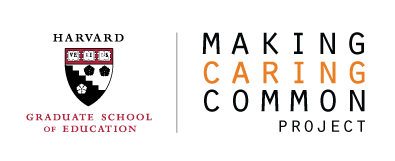Fostering student-led civil discourse at The Loomis Chaffee School
Inspired by the Caring Schools #CommonGood campaign’s call to engage students in activities that enable them to "talk across the aisle," The Loomis Chaffee School has placed prominent focus on their “Shultz Fellows” Club to encourage students to discuss political topics and educate their school community about handling civil discourse.
Eric LaForest, Keller Family Director of the Norton Family Center for the Common Good at The Loomis Chaffee School, explained that the club "encourages in students an expanded understanding of their roles as citizens in a diverse democracy and fosters an active, engaged approach to citizenship and global society" and that students are inspired to support the “school’s mission to serve ‘the best self and common good.’” Read on to learn more from Eric LaForest about the club and key takeaways for other school leaders.
What is The Shultz Fellows Club?
Named after Secretary of State George Shultz (a 1938 graduate of the school), this non-partisan political discussion group’s membership is balanced along political lines (liberals, conservatives, independents, you name it), and they have weekly discussions as well as open meetings that help the broader school community see best practices for civil discourse.
Why was this initiative started at Loomis Chaffee?
With the support of our Head of School Dr. Sheila Culbert, former Student Council president Taseen Anwar ’17 established the Shultz Fellows program two years ago with the hope of bringing students together who might not otherwise exchange ideas about politics and current events. With the Caring Schools #CommonGood campaign in full swing, Loomis Chaffee has been pushing along this club with greater interest and engaging more students in talking across the aisle.
Can you tell us more about how it’s run and administered?
The group's closed meetings are typically centered around a particular issue that has captured the students' attention that week: tax reform, gun violence, climate change, the #MeToo movement, and everything in between. Those conversations are built upon the relationships that students had formed with each other over the years, and so there is a shared and guaranteed trust that they can rely upon even as they challenge viewpoints and question assumptions. Many of the students involved have taken our required Freshman Seminar in the Common Good, which focuses on discussion, civil discourse, and community engagement. Also, for six years now, the Norton Center has organized near-monthly "Dialogues in the Common Good," open to all members of the community and usually dedicated to difficult topics suggested by students. The Shultz Fellows borrow these principles and practices and create their own community of politically engaged student leaders.
What are the key takeaways so far?
This year, the group held an open meeting on the first anniversary of President Trump’s inauguration, attracting students from a wide variety of political positions to discuss the ups and downs of the first year. The group also organized a discussion of the controversy surrounding NFL players' national anthem protests. Both of these well-attended non-mandatory events were vibrant and thoughtful discussions. Another highlight of the year was a conference call that brought together the Shultz Fellows, other Loomis students, and cadets from Riverside Military Academy in Gainesville, Georgia. We spent a productive hour discussing gun rights and gun violence.
How are you evaluating your program?
Since the Shultz Fellows program is organized by students, I have resisted the temptation to institutionalize and routinize what they are doing. So, therefore, the group has its busy times and its slow times (around college application deadlines, for instance). For this coming year the process of selecting members has changed; now a handful of younger students have been invited to join so that the group has more continuity from year and year. Since the group does not have an open application process for new members, our best measurement of its impact is attendance at its non-mandatory events as well as its reputation around campus.
What advice would you offer to schools also attempting to implement a talking across the aisle initiative?
Enlist and empower students who are already actively engaged and interested in politics and current events. Early in the process, establish some guidelines for what constitutes civil discourse and, if needed, teach what civil discourse means and does not mean. Allow for some messiness and inconsistency. Lay the groundwork for a program like this early on by providing curricular and non-curricular opportunities for students to become curious about and invested in the issues of the day.
Guest post by Danielle Fowler. Originally published August 2018.






